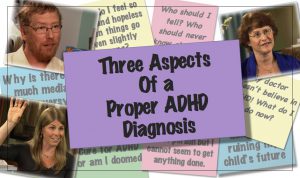ADHD Diagnosis Includes
Beyond the questionnaires, there should be interviews with parents, siblings and spouses – because this disorder leaves a stamp on every stage of life.
Three Aspects of an ADHD Diagnosis:
- Seeing a doctor who is an ADHD specialist
- Completing a series of assessments which include an interview with your doctor
- A look through your personal history (report cards, interviews with parents or a longtime friend)
Transcript
Dr. Margaret Weiss – I think when somebody walks into the office they don’t know what to expect and the single biggest complaint for many of the patients that I see is that someone has had them fill out a checklist, the checklist showed that they had these symptoms or those symptoms and therefore they received a diagnosis of ADHD.
Dr. Annick Vincent – when you go through the ADD process you would get diagnosed for Attention Deficit Hyperactivity Disorder it’s like if you have an eye problem you go to the eye specialist. So they would go through a series of exam and then see what you have and like myopia we have treatment options to correct the myopia of the brain.
[Dr. Jain] Do you remember in childhood being a worrywart? I mean even it wasn’t something specific were you the kind of kid that would check the doors check the locks? Worried about things in a way that said you know have these kinds of quirky habits?
Dr. Steven Kurtz – there’s no blood tests to be done there’s no brain imaging to be done and when we do psychological testing it’s not to make a diagnosis of ADHD but to understand more about children’s learning learning issues? Their strengths, their weaknesses, to try and pick up learning disabilities. If they’re there.
Dr. Jain – so any other kinds of nervous habits like picking your nose picking your skin twirling your hair button your collar or that kind of stuff?
(Dr. Weiss) A good assessment for ADHD includes finding out why the patient’s there the history of how they came to be there the family psychiatric history the medical history. Most important the developmental history because ADHD when it’s present puts a stamp on each stage of development. So you may see colic in infancy you may see a preschooler who was expelled from preschool or you may see a child who couldn’t do homework in grade 3 or was kicked off the football team for misbehaviour.
[Dr. Jain] did people ever say that you were like I don’t know odd or awkward in your play?
[Dr. Kurtz] so what’s required to do a good evaluation is different reporters asked some of the same questions in different ways. So you must include parent and teacher reports of children.
[Dr. Jain] You’re the class clown schools not terribly interesting academically for you you’re not involved in sports you certainly are very curious kid like to do lots of different things. You see yourself getting into a bit of trouble, a bit of disruption of school, as well. Were you a talker?
[McKenna] yes remember teachers saying stop talking that kind of stuff all the time that’s all they really ever said to me.
[Dr. Weiss] okay so finding out the course of the life history and connecting that with symptoms is really important.
[Dr. Jain] and my mum didn’t have any problems during her pregnancy or delivery of you know I thought I know okay so no one said bike I should know he was in the hospital for five days or something was going on with him while we were worried about it was.
Dr. Steven Kurtz – The current diagnostic rules require that kids have symptoms by age seven so you don’t all of a sudden wake up as an 8 year old or a 7 year old and have ADHD there were to be a timeline of a progression that makes sense.
View related videos
View related blog posts


Leave A Comment
You must be logged in to post a comment.